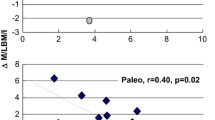Summary
Background
Diets rich in carbohydrates with a low glycemic index and with high fiber content are associated with flat post–prandial rises of blood glucose, minimal post-prandial insulin secretion and maintenance of insulin sensitivity. Protective food commodities in the prevention of cardiovascular disease, insulin resistance syndrome or diabetes are crucial components of the vegetarian diet.
Aim of the study
Insulin resistance values were assessed in relation to different nutrition. Metabolic abnormality is a predictor of age–related diseases and can be more pronounced in obese subjects. Insulin resistance values in normal weight subjects of two different nutritional habits were correlated with age.
Methods
Fasting concentrations of glucose and insulin as well as calculated values of insulin resistance IR (HOMA) were assessed in two nutritional groups of apparently healthy adult subjects (age range 19 – 64 years) with normal weight (body mass index 18.6 – 25.0 kg/m2): a vegetarian group (95 long–term lacto–ovo–vegetarians; duration of vegetarianism 10.2 ± 0.5 years) and a non-vegetarian control group (107 subjects of general population on traditional western diet). Intake of energy and main nutrients (fats, saccharides, proteins) was similar in both groups.
Results
Glucose and insulin concentrations and IR (HOMA) values were significantly lower in vegetarians (glucose 4.47 ± 0.05 vs. 4.71 ± 0.07 mmol/l; insulin 4.96 ± 0.23 vs. 7.32 ± 0.41 mU/l; IR (HOMA) 0.99 ± 0.05 vs. 1.59 ± 0.10). IR (HOMA) dependence on age was only significant in subjects on a western diet. A significant increase of IR was found already in the age range 31–40 years, compared to vegetarians and it continued in later age decades. Age independent and low insulin resistance values in vegetarians are a consequence of an effective diet prevention by long–term frequent consumption of protective food. Vegetarians had a significantly higher consumption of whole grain products, pulses, products from oat and barley.
Conclusion
The results of age independent and low values of insulin resistance document abeneficial effect of long–term vegetarian nutrition in prevention of metabolic syndrome, diabetes and cardiovascular disease.
Similar content being viewed by others
References
Sievenpiper JL, Jenkins AL, Whitham DL,Vuksan V (2002) Insulin resistance: concepts, controversies, and the role of nutrition. Can J Diet Pract Res 63:20–32
Reaven GM (2000) Diet and syndrome X. Curr Atheroscler Rep 2:503–507
Rizkalla SW, Belliste F, Slama G (2002) Health benefits of low glycaemic index foods, such as pulses in diabetic patients and healthy individuals. Br J Nutr 88:255–262
Mathews DR, Hosker JP, Rudenski AS, Naylor BA, Treacher DF, Turner RC (1985) Homeostasis model assessment, insulin resistance and β-cell function from fasting plasma glucose and insulin concentrations in man. Diabetologia 28:412–419
Slovak Food Data Bank (1999) Food Research Institute, Bratislava
Krajčovičová- Kudláčková M, Blažíček P, Babinská K, Kopčová J, Klvanová J, Béderová A, Magálová T (2000) Traditional and alternative nutrition – levels of homocysteine and lipid parameters in adults. Scand J Clin Lab Invest 60:657–664
Krajčovičová- Kudláčková M, Dušinská M (2004) Oxidative DNA damage in relation to nutrition. Neoplasma 51:30–33
Key TJ, Gwyneth KD, Appleby PN (1999) Health benefits of a vegetarian diet. Proc Nutr Soc 58:271–275
Snowdon DA, Phillips RL (1985) Does a vegetarian diet reduce the occurrence of diabetes? Am J Publ Health 75:507–512
Jang Y, Lee JH,Kim OY, Park HY, Lee SY (2001) Consumption of whole grain and legume powder reduces insulin demand, lipid peroxidation, and plasma homocysteine concentration in patients with coronary artery disease. Arterioscler Thromb Vasc Biol 21:2065–2071
Jenkins DJA,Wolever TMS, Colier GD, Ocana A, Rao AV, Burckley G, Lam Y, Mayer A, Thompson LU (1987) Metabolic effects of a low-glycemic-index diet. Am J Clin Nutr 46:968–975
Ascaso JF,Romero P,Real JT,Lorente RI, Martinez-Valls J, Carmena R (2003) Abdominal obesity, insulin resistance and metabolic syndrome in a southern European population. Eur J Intern Med 14:101–106
Krajčovičová- Kudláčková M, Blažíček P, Dušinská M (2004) Insulin resistance and body mass index. Cor Vasa 46:85–87
Zavaroni I, Bonini L, Gasparini P, Barilli AL, Zuccarelli A, Dall’Ag E, Delsignore R,Reaven GM (1999) Hyperinsulinemia in a normal population as a predictor of non-insulin dependent diabetes mellitus, hypertension, and coronary heart disease, the Barilla factory revisited. Metabolism 48:989–994
Author information
Authors and Affiliations
Rights and permissions
About this article
Cite this article
Valachovičová, M., Krajčovičová-Kudláčková, M., Blažíček, P. et al. No evidence of insulin resistance in normal weight vegetarians. Eur J Nutr 45, 52–54 (2006). https://doi.org/10.1007/s00394-005-0563-x
Received:
Accepted:
Published:
Issue Date:
DOI: https://doi.org/10.1007/s00394-005-0563-x




